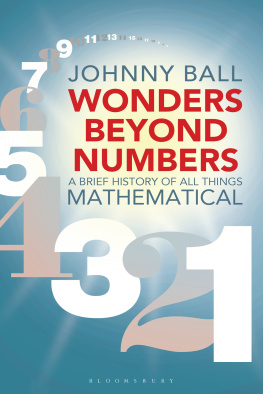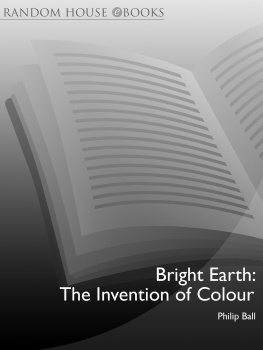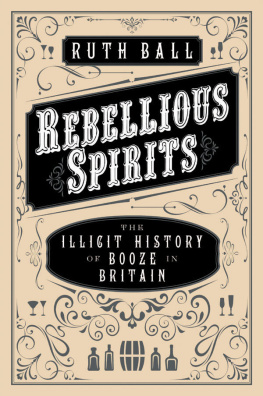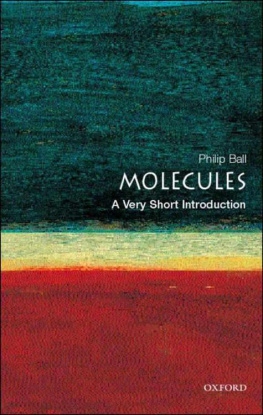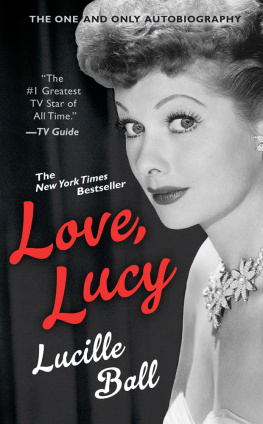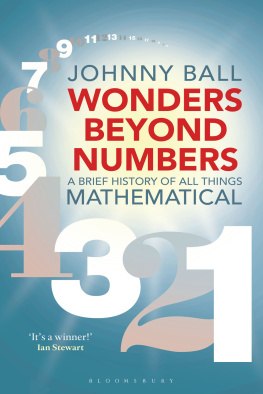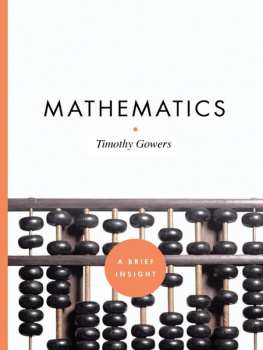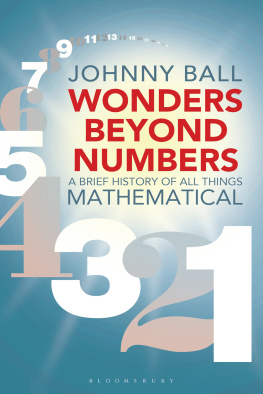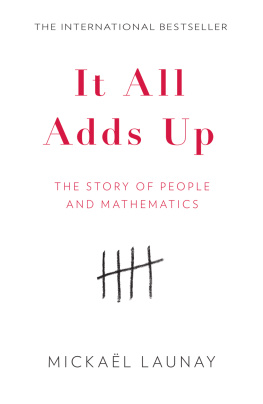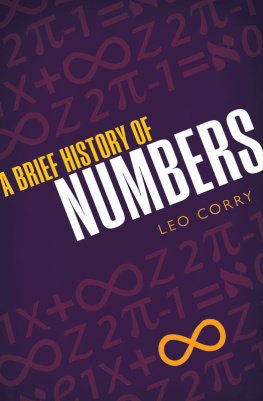Wonders Beyond Numbers
Also available in the Bloomsbury Sigma series:
Sex on Earth by Jules Howard
p53: The Gene that Cracked the Cancer Code
by Sue Armstrong
Atoms Under the Floorboards by Chris Woodford
Spirals in Time by Helen Scales
Chilled by Tom Jackson
A is for Arsenic by Kathryn Harkup
Breaking the Chains of Gravity by Amy Shira Teitel
Suspicious Minds by Rob Brotherton
Herding Hemingways Cats by Kat Arney
Electronic Dreams by Tom Lean
Sorting the Beef from the Bull by Richard Evershed
and Nicola Temple
Death on Earth by Jules Howard
The Tyrannosaur Chronicles by David Hone
Soccermatics by David Sumpter
Big Data by Timandra Harkness
Goldilocks and the Water Bears by Louisa Preston
Science and the City by Laurie Winkless
Bring Back the King by Helen Pilcher
Furry Logic by Matin Durrani and Liz Kalaugher
Built on Bones by Brenna Hassett
My European Family by Karin Bojs
4th Rock from the Sun by Nicky Jenner
Patient H69 by Vanessa Potter
Catching Breath by Kathryn Lougheed
PIG/PORK by Pa Spry-Marqus
The Planet Factory by Elizabeth Tasker
Immune by Catherine Carver
To my dear wife Di, who is by far the greatest wonder in my life.

Contents
Among my earliest recollections was playing fives and threes with my parents when I was about six, using double-nine dominoes (Dad always said, Double-six dominoes are for wimps.). Not yet able to hold more than two dominoes in my hands, I set them on their edges, and soon worked out that double 7 and double 8 were useless on their own, because 14 and 16 arent multiples of five or three but placed at each end they added up to 30, six fives and ten threes, making 16, the maximum score.
At Kingswood School, Bristol, aged seven, we used to bang on our desks shouting, We want homework! So I can only assume our teacher was doing something right! He would give us 100 simple sums and say, If you do 10, Ill be happy. While listening to the radio with my folks in the evening, I always relished the challenge of completing the entire 100.
When I was eight, Dad acquired and refurbished a 6ft snooker table, and let me win a game when I was 11. Snooker is nothing more than applied mathematics, as you learn to assess angles and the effects of controlling the cue ball. I played right through my teens and once, in a match, I played a shot off the rounded angle of the middle pocket on a full-sized table, and struck the distant yellow ball perfectly, laying it safely on the end cushion.
At school I was always top in maths, but just after sitting my 11+ exam, my parents moved back to their home town of Bolton, Lancashire. I went with them, and the local grammar school placed me in form 2B. I won a maths and a chess prize in my first year, but through an accident and an illness, I lost a good half of each of the next two autumn terms and regressed through forms 3C, 4D, lower 5E and finally 5E, as they didnt have a 5F. I had come off the rails and only achieved two O levels. However, my GCSE maths score was still 100 per cent, even though I hadnt taken a note for two years. On almost my last day at that school, our senior maths mistress saw my work for the first time and told me I had a strong mathematical brain.
A major aircraft manufacturer gave me a job on the condition I got three more O levels, which I did. More than that, however, I took to the engineering world like a duck to water, and my energy and maths ability helped me streak ahead of better qualified lads on my course, as I quickly taught myself to multiply double figures in my head. I personally worked out the individual costs of the 1,400 parts of the Blackburn Beverley propeller unit, including thousands of machine time costs. I was still only 16.
Aged 18, I signed up for the RAF and came top in my training course. I soon found myself among the boffins testing guided missiles and the latest radar technology in Wales. Later, working with Air Traffic Control in Hanover, Germany, I grasped all that was needed to identify aircraft on our radar screens, often just from the blip they produced, and their speed.
By now I had started to search out books on the subject I loved above all others, mathematics. The Penguin books of Eugene P. Northrop and W. W. Sawyer were soon joined by the puzzles of Ernest Henry Dudeney and Boris Kordemsky. It was Martin Gardner, however, who really broadened my maths horizons, with his republished articles on recreational mathematics, which had first appeared in Scientific American .
You could say the RAF had been my university and young mans playground; straight afterwards the fun continued, as I joined Butlins as a Redcoat Host for three glorious years at smile school. Stand-up comedy followed, which I loved, and soon TV and radio beckoned, and I was recommended to BBC Childrens TV. Their integrity and care impressed me and soon I was writing comedy sketches for adult TV and a childrens show called Playaway.
In 1977 I was asked what I would do if I had my own TV show, and without hesitation I said, Probably a show on maths! All around me jaws dropped, but Think of a Number was born, winning a BAFTA in its first series. Think Again won more awards; in all I wrote and presented solo 20 series of TV shows based on maths and science. Now it seemed my sketchy education and lack of single-subject degree were perhaps my salvation. By researching every single topic from scratch, my across-the-board knowledge and understanding just grew and grew.
Mathematics has been my travelling companion throughout my entire life. Very often today people stop me to say that my TV shows helped them on their paths to become scientists, teachers, statisticians, model jet-engine makers, Big Issue sellers, bookmakers, nuclear physicists, authors and more. I am truly a very lucky man.
So now I have written Wonders Beyond Numbers , to celebrate my love of this subject, and to show how maths, science, technology, art, music, architecture and engineering all developed through a huge relay race of achievements. Running this race have been many brilliant minds, born in ignorance and innocence, but who progressed by wanting to know more and to see further, as Newton once said, By standing on the shoulders of the giants that have gone before.
More importantly, I want to remove much of the fear in so many people who, when maths is even mentioned, actually shrink into their shells rather than stand tall. For so many, the hated concepts of addition, subtraction, multiplication and division are all there is to maths. Its rather like a tourist saying, Isnt the sea beautiful? to which a guide might say, Well, yes, but youre only looking at the top of it.
Mathematics is like an ocean, with our number system counting for little more than the surface. In fact, the true depth and wonder of mathematics makes it by turns a fun, exciting, exhilarating, empowering and often truly amazing playground.
I have always been a terrible swimmer, but where maths is concerned I have just dived in. Now I want you to strip off your inhibitions and come and join me for the ocean of mathematics is full of amazing things, and extraordinary stories of the brave and heroic people who opened up this world of wonders for us.
If I can paraphrase Galileo (one of the greatest): Everything in the Universe is written in a language, through which we can understand absolutely anything and everything. That language is mathematics and the symbols are triangles, squares, circles and other geometric figures. So the wonders of the mathematical world have always been well beyond just numbers.

